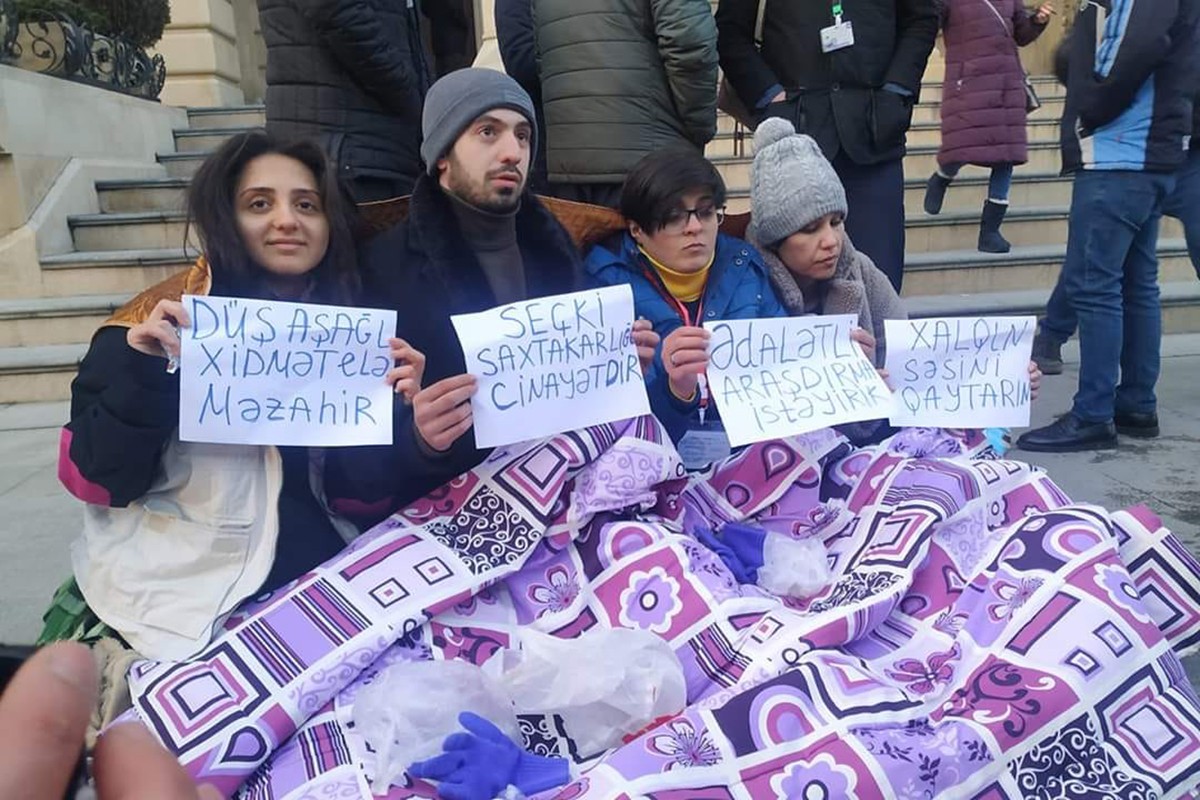
Police have forcefully dispersed a spontaneous protest outside the Central Election Committee in Baku against the results of Sunday’s parliamentary elections. Several people were injured during the dispersal, in which police also attacked journalists covering the protest.
Participants reported that officers surrounded the small group of several dozen protesters before ordering them to disperse. After protesters refused to do so, the police forced them into buses before leaving them on the city outskirts.
Several of the protesters, including candidates in the elections, as well as journalists covering the event, reported that police beat them both during the dispersal and once they had been detained.
The protest began on Tuesday afternoon after Rabiyya Mammadova, a candidate in Sunday’s election, began protesting outside the Central Election Committee against electoral fraud.
According to the preliminary results released on Monday, Mammadova did not win her seat. She told journalists that the Committee was ignoring numerous reports on social media of falsifications during the elections.
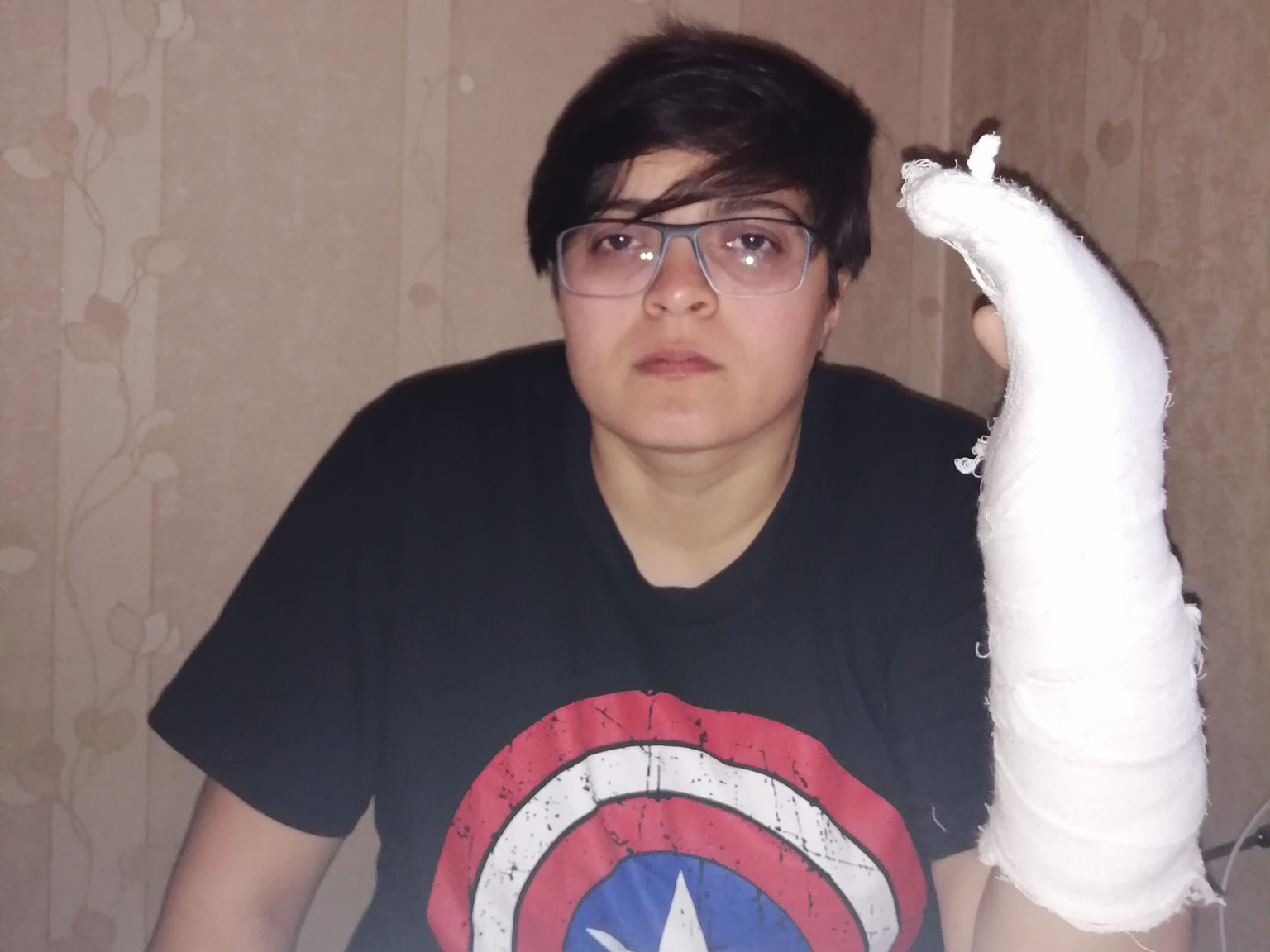
Sunday’s election saw hundreds of reports of electoral fraud, including carousel voting, multiple voting, and ballot-box stuffing.
[Read more on OC Media: Preliminary results show almost no change in Azerbaijan parliament]
After images of Mammadova’s protest spread online, others joined her.
Elman Guliyev, the head of the opposition Musavat Party’s youth wing, told OC Media that he and other members of the party joined Mammadova as soon as they saw her protest on social media.
Several other smaller protests have also taken place since Sunday’s poll but were immediately dispersed by police.
Violence during the dispersal
Guliyev told OC Media that when police blocked off the square where the protest was being held, over 100 people had gathered.
‘Then a police squad came, each of us was dragged to the buses by 4-5 police officers, they were using force towards us, were beating us […] then they were driving us around the city’, he said.
Arzulla Buludlu, a 59-year-old activist from the Musavat Party, said the police used violence against him.
‘They kicked me in my ribs, and when I bent over they hit me in the head. I was left at their feet. My leg was almost broken […] And then they violently threw me to the bus’, he told OC Media.
Footage of the dispersal by Nurlan Gakhramanli.
Several of the detainees who were injured were taken to hospital for treatment, however, they reported that they were not given proper care.
Buludlu told OC Media that despite doctors providing him with medical care, the results of the examinations were announced by police officers.
‘They [the police officers] treated me so badly, that even the doctors were discontent with it.’ Buludlu said he was informed that his chest was severely injured.
Journalist Sevinj Vagifgizi told journalists that police officers prevented the doctors from working properly.
‘The doctors treated us as we were enemies, they did not provide us with medical care. I don’t know whether it is connected with their fear of the police, or it is the attitude of doctors and other state workers towards us’, Guliyev said.
Violence against journalists
During the dispersal, police also attacked several journalists.
Nurlan Gahramanli, a journalist and activist who was present at the protest, told OC Media that around 10 journalists were injured when the police moved in on the protesters.
He said journalists Aytaj Tapdiq, Khayala Aghayeva, Ulviyya Ali, Aygun Rashid, and Nargiz Absalamova, were all ‘beaten and insulted’ by police officers. Journalist Khadija Ismayil was pulled to the ground and injured, he said.
Journalist Aynur Elgunesh told OC Media that a police officer pushed her. ‘I told him that I am a journalist and he said he didn’t care. Then he hit me on the head and I fell, then he kicked me’.
‘Then they dragged me to the bus where I felt bad, because he kicked me in the gall bladder where I recently had surgery’, she said.
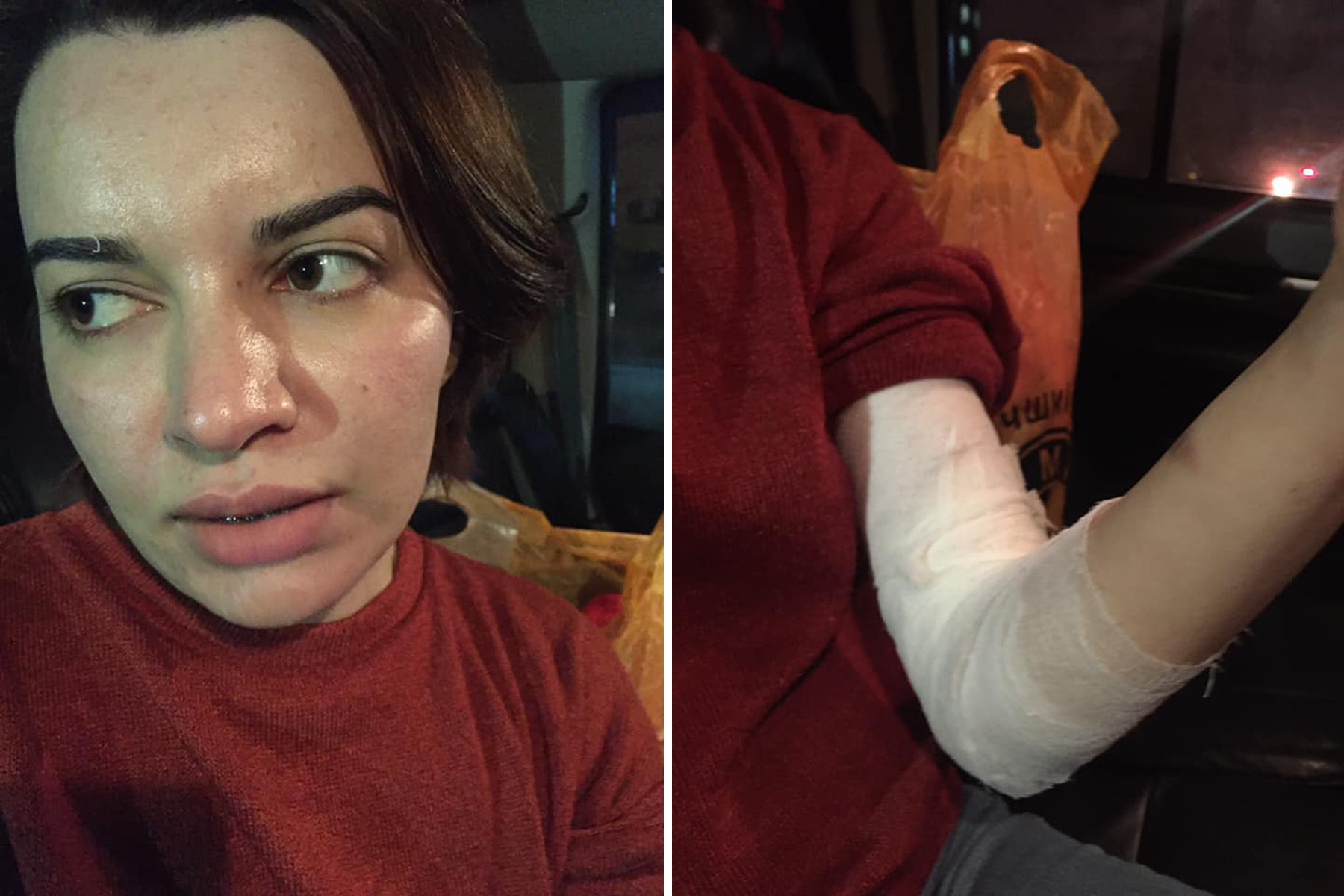
MustafaHajibayli, the editor-in-chief of Basta media, which has links with the Musavat Party, was among the journalists detained.
He wrote on Facebook that he was beaten by three police officers inside a police car.
‘Three people were violently punching and kicking me in the face inside a big police car. They kept me here for half an hour with my face covered in blood. Then they brought me to the CEC building so that I could wash my face’, he wrote.
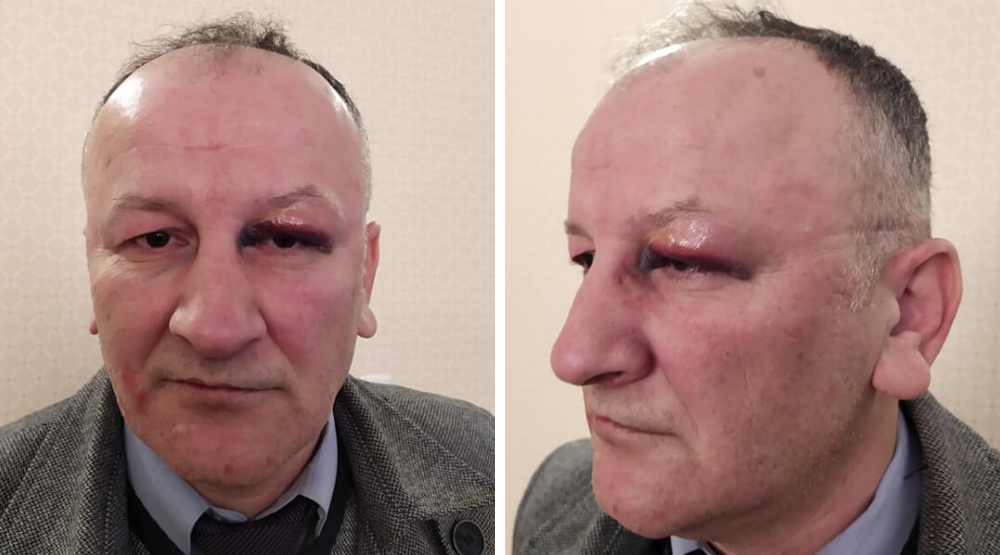
Reactions to the dispersal
In a statement on Wednesday, the OSCE Representative on Media Freedom, Harlem Désir, labelled the police’s actions ‘deplorable’.
‘I am very concerned by last night’s detentions, violent incidents and mistreatment by law enforcement representatives of journalists who were covering the public protest. This is particularly unacceptable as journalists were reporting on the events of public interests, related to the aftermath of the recent legislative elections’.
I strongly deplore last night’s harassment of & violence against journalists, reporting on a protest regarding recent legislative elections, by law enforcement in #Azerbaijan. Media must be able to cover such events without intimidation or violence. See: https://t.co/nta3fIWXLu
— OSCE media freedom (@OSCE_RFoM) February 12, 2020
Akif Qurbanov, the head of the Institute for Democratic Initiatives, a local election observation group, told OC Media that the use of force by police against candidates violated election law.
According to him, the Election Code guarantees candidates’ activities and this guarantee lasts from their registration until the announcement of the final results. ‘The candidates who participated in the protest still have the right to inviolability’, he said.
Ehsan Zakhidov, the chief spokesperson of the Ministry of Internal Affairs, defended the police’s actions.
Zakhidov told the APA news agency that the demonstration was unsanctioned and that police were forced to remove protesters after they refused to disperse.
He said that after CEC employees tried to explain the situation to protesters, ‘those people continued their illegal actions’. After that, he said, CEC workers addressed the police to prevent the action.
He said that one person resisting the police was detained.
Zakhidov claimed that reports on social media of injured people were untrue and that it was being investigated.
Zakhidov later told Turan there were no journalists were among the detainees, but there were ‘protesters who had identified themselves as journalists’.
‘Undemocratic’ elections
This Sunday, Azerbaijan saw the first snap parliamentary elections in the country’s history.
The election was marked by violence against journalists and observers and widespread electoral violations.
With the results in from all polling stations, the ruling new Azerbaijan Party won 72 of 125 seats, in 2015 they won 69, while 43 independent candidates were elected.
On Monday, opposition coalition the National Council of Democratic Forces stated that the elections were falsificated and ‘do not reflect the will of the people’. Similar statements came from the Umid and Real Parties.
The Musavat Party called for the cancellation of the results.
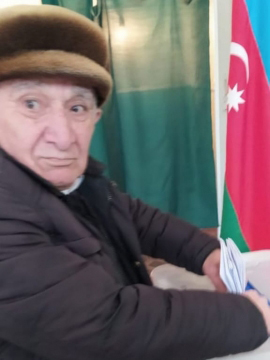
In a joint statement on Monday, the observation missions from the OSCE and Parliamentary Assembly of the Council of Europe (PACE) called into question the results.
‘The restrictive legislation and political environment prevented genuine competition in Azerbaijan’s early parliamentary elections’, the statement said.
‘Although some prospective candidates were denied the right to stand, candidate registration was otherwise inclusive. Despite the large number of candidates, voters were not provided with a meaningful choice, due to a lack of real political discussion.’
The head of the PACE delegation, Frank Schwabe, said that ‘despite some appearance of progress in the preparation for the elections, the widespread violations of counting procedures raised serious concerns about the results of the voting in general’.
Artur Gerasymov, Special Coordinator for the OSCE observer mission said, ‘I regret very much that what could have been improvements did not lead to a competitive environment enabling truly democratic elections. Counting on election day was disappointing. I would have hoped for some real changes.’
The European Union also stated on Tuesday that they ‘regret that long standing recommendations by OSCE/ODIHR and the Council of Europe’s Venice Commission still have to be addressed. The EU stands ready to assist in this process’.
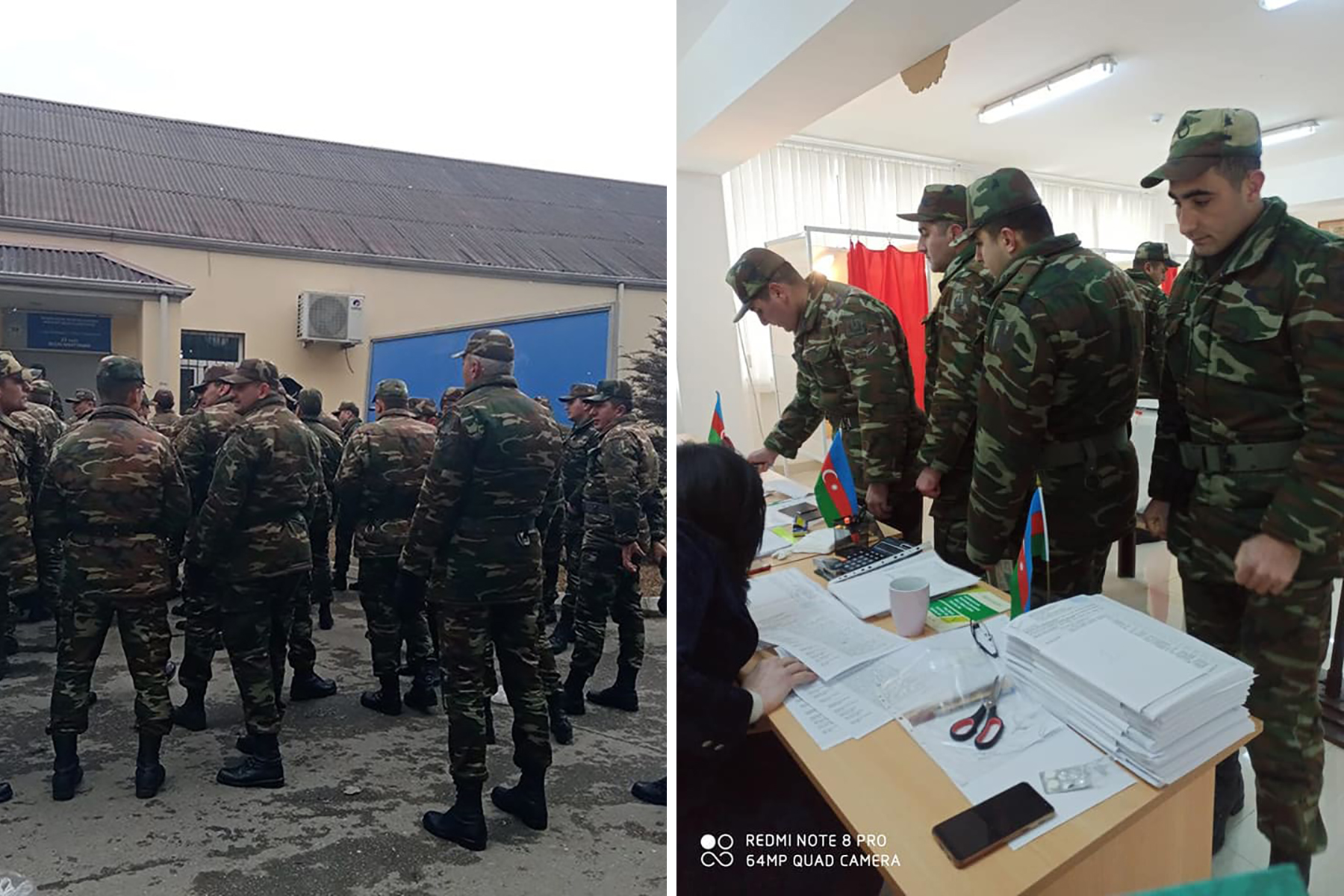
Arif Hajili, the chair of the Musavat party, stated on Tuesday that Musavat and Real parties, along with the D18 organisation and independent candidates had requested permission from the Baku city administration to hold a protest on 16 February.
Ruslan Izzetli, the head of the D18 Movement, told OC Media that he was denied permission for the protest on Wednesday before being told they could hold a protest in Lokbatan, on the outskirts of Baku.









